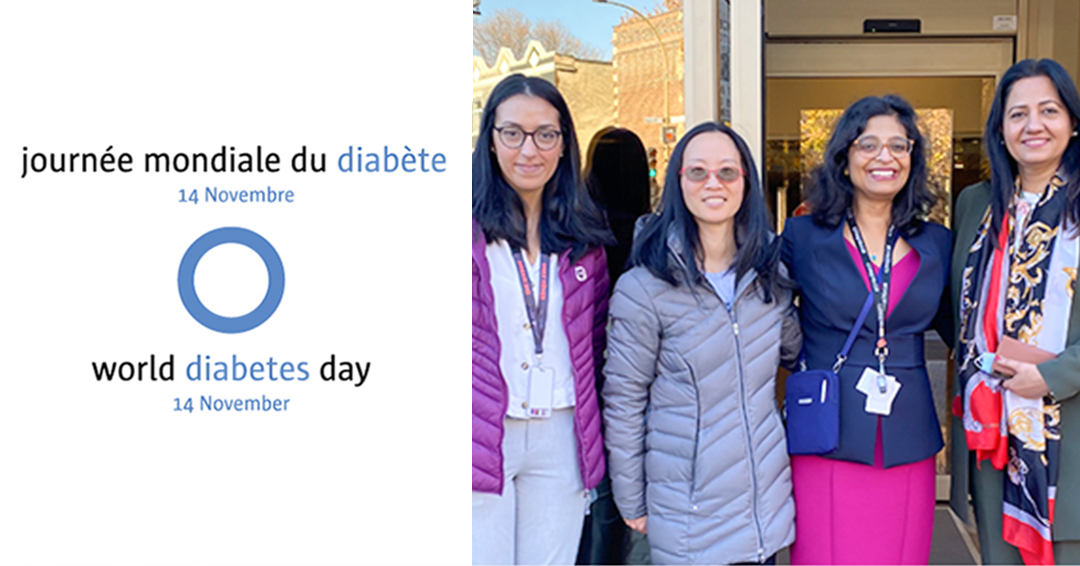
In a collaboration with British researchers, Dr. Kaberi Dasgupta is leading a clinical trial that combines supervised exercise with meal replacements for weight loss and diabetes remission
Almost 6 million Canadians are living with diagnosed diabetes (type 1 or type 2) according to Diabetes Canada, and the incidence rate is on the rise.
Dr. Kaberi Dasgupta is trying to change this, by advancing research and working with policymakers. A senior scientist in the Metabolic Disorders and Complications Program at the Research institute of the McGill University Health Centre (RI-MUHC), Dr. Dasgupta is leading the “RESET for remission” study. This joint Canada-UK project is funded by the Canadian Institutes of Health Research (CIHR) as part of the “100 Years of Insulin” program and by the Medical Research Council of the United Kingdom. The randomized clinical trial aims to help people 18 to 45 years old with type 2 diabetes reverse this condition, by bringing their blood sugars below diabetes levels without medications.
RESET adds a structured supervised exercise strategy to a low-energy, partial meal replacement diet. Researchers hope to improve the diastolic function of the heart: in other words, the relaxation phase of the heart’s contraction and relaxation cycles. Small changes in the heart’s relaxation cycle can be one of the early signals of diabetes.
“In the UK, a large pilot project is currently being implemented to offer the dietary component to several thousand young people living with type 2 diabetes,” explains Dr. Dasgupta, who is also director of the Centre for Outcomes Research and Evaluation at the RI-MUHC. “Our innovation is the combination of the diet with supervised exercise, to understand the added benefits.”
Those in the active intervention arm of the RESET study receive a low-calorie diet that includes meal replacements like shakes and bars. They also exercise, under supervision at a gym two to three days each week. After three months they shift to a healthy food-based diet and exercise monitoring without direct supervision. Those in the comparison group take the same tests as the experimental group and are offered the special diet six months later, to thank them for participating.
A promising project receiving attention from the federal government
The RESET project drew the attention of Member of Parliament Sonia Sidhu, chair of the All-Party Diabetes Caucus. On November 2, 2022, she visited the RI-MUHC as part of her work to implement the Framework for Diabetes in Canada, which outlines national efforts to better recognize, collaborate with, and support those impacted by diabetes in Canada.
MP Sidhu was hosted by Dr. Dasgupta, who introduced the RESET study and other key clinical trials focused on diabetes. Drs. Meranda Nakhla and Julia Von Oettingen, both scientists in the Child Health and Human Development Program, also participated in the meeting and presented research on type 1 diabetes.
Dr. Nakhla spoke about her work to improve the transition from pediatric to adult care for emerging adults (ages 18 to 30) with type 1 diabetes, in the CIHR-funded study called GET-IT-T1D. Dr. Von Oettingen presented the CAnadian Pediatric diAbetes ConsortIum (CAPACIty), which is creating a network and national pediatric diabetes registry, with the goal of informing the implementation and evaluation of interventions to improve the health and well-being of children and youth. The CAPACIty study is funded jointly by the CIHR and JDRF, which is a global organization funding type 1 diabetes research.
MP Sidhu also visited the RI-MUHC’s Centre for Innovative Medicine (CIM), where RESET study participants go for their evaluations, including exercise stress testing, blood work, and body composition studies. A fully equipped “research hospital within a hospital,” the CIM hosts and facilitates pediatric and adult clinical research studies, offering access to specialized clinical research staff and a full range of equipment and services required to conduct clinical research.
“It was an honour and a privilege to meet with MP Sidhu,” says Dr. Dasgupta. “To have a real effect on people’s lives, we need progress in research, but also changes in policy. Ultimately, we would like to scale up our innovations across the country to manage and support all forms of diabetes and to prevent and to induce remission of type 2 diabetes.”
——–
The RESET study is currently enrolling participants. Learn more about the RESET study or contact the study coordinator at RESET [at] muhc.mcgill.ca.
